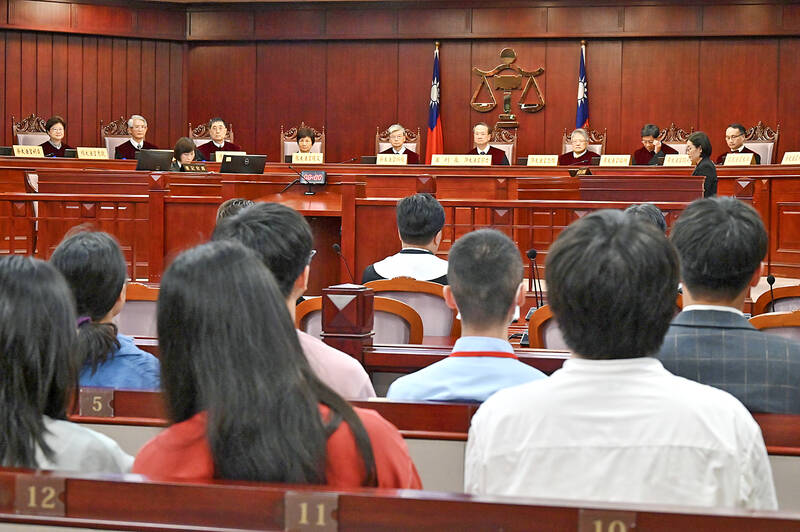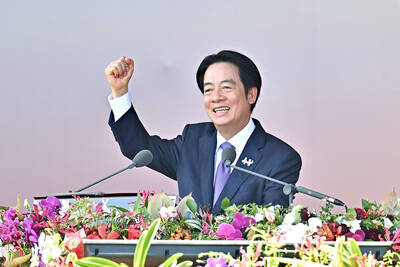Measures adopted by the legislature to raise the thresholds for Constitutional Court rulings are to take effect tomorrow after being promulgated by President William Lai (賴清德), while the Democratic Progressive Party (DPP) caucus said it has applied for a temporary injunction and a constitutional interpretation of the changes.
Presidential Office spokesperson Karen Kuo (郭雅慧) in a statement said that Lai had signed the amendments to the Constitutional Court Procedure Act (憲法訴訟法) into law.
The amendments are to take effect tomorrow, three days after promulgation.

Photo: George Tsorng, Taipei Times
Kuo cited the president as saying the measures risked disrupting Constitutional Court operations, usurping the judicial authorities’ powers and undermining the principle of separation of powers between government branches.
Lai is calling for a ruling on the constitutionality of the amendments, the spokesperson added.
Asked whether the Executive Yuan would seek a constitutional interpretation, spokesperson Michelle Lee (李慧芝) said it is deliberating the matter with Minister Without Portfolio Lin Min-hsin (林明昕).
DPP caucus whip Ker Chien-ming (柯建銘) told a news conference yesterday that a request for the court to grant a temporary injunction and review the law had been filed.
A spokesman for the court later confirmed that it had received the request.
The DPP took the action shortly after lawmakers from the Chinese Nationalist Party (KMT) and the Taiwan People’s Party (TPP), who together have a majority in the legislature, upheld the measures they had previously pushed through in a revote requested by the Cabinet.
However, with the new measures requiring a minimum of 10 justices to hear and rule on a case, it remains unclear whether the Constitutional Court, which normally has 15 justices, but currently has only eight, can review such a case.
Lai had nominated seven candidates to replace those whose eight-year terms ended on Oct. 31 last year, but all were rejected by the legislature.
The president has yet to select new nominees.
According to another new measure, a ruling declaring an existing legal provision unconstitutional must be backed by at least nine justices.
The amendments replaced previous rules that only mandated the presence of at least two-thirds of all sitting justices, with a ruling determined by a simple majority vote.
The amendments have been criticized by the DPP and civic groups as an attempt by the opposition to immobilize the court, which primarily handles petitions from the public, but also intervenes in disputes among top government bodies.
KMT and TPP lawmakers have defended the revisions, saying they would ensure more rigorous reviews by the court and that a minimum attendance requirement would prevent future cases from being decided by only a handful of justices.
The KMT yesterday said that Lai’s promulgation of the law and application for a constitutional interpretation was the worst example of going against public opinion.
Abiding by the law is the basic duty of the government, the KMT said, adding that the DPP should not act like a “crybaby” and should understand the way things work in a minority government.
Additional reporting by Chen Yun

The Ministry of the Interior (MOI) is to tighten rules for candidates running for public office, requiring them to declare that they do not hold a Chinese household registration or passport, and that they possess no other foreign citizenship. The requirement was set out in a draft amendment to the Enforcement Rules of the Public Officials Election and Recall Act (公職人員選舉罷免法 ) released by the ministry on Thursday. Under the proposal, candidates would need to make the declaration when submitting their registration forms, which would be published in the official election bulletin. The move follows the removal of several elected officials who were

FOUR DESIGNATED AREAS: Notices were issued for live-fire exercises in waters south and northwest of Penghu, northeast of Keelung and west of Kaohsiung, they said The military is planning three major annual exercises across the army, navy and air force this month, with the navy’s “Hai Chiang” (海強, “Sea Strong”) drills running from today through Thursday, the Ministry of National Defense said yesterday. The Hai Chiang exercise, which is to take place in waters surrounding Taiwan, would feature P-3C Orion maritime patrol aircraft and S-70C anti-submarine helicopters, the ministry said, adding that the drills aim to bolster the nation’s offshore defensive capabilities. China has intensified military and psychological pressure against Taiwan, repeatedly sending warplanes and vessels into areas near the nation’s air defense identification zone and across

SENATE RECOMMENDATION: The National Defense Authorization Act encourages the US secretary of defense to invite Taiwan’s navy to participate in the exercises in Hawaii The US Senate on Thursday last week passed the National Defense Authorization Act (NDAA) for Fiscal Year 2026, which strongly encourages the US secretary of defense to invite Taiwan’s naval forces to participate in the Rim of the Pacific (RIMPAC) exercise, as well as allocating military aid of US$1 billion for Taiwan. The bill, which authorizes appropriations for the military activities of the US Department of Defense, military construction and other purposes, passed with 77 votes in support and 20 against. While the NDAA authorizes about US$925 billion of defense spending, the Central News Agency yesterday reported that an aide of US

NATIONAL DAY: The ‘Taiwan Dome’ would form the centerpiece of new efforts to bolster air defense and be modeled after Israel’s ‘Iron Dome,’ sources said President William Lai (賴清德) yesterday pledged to strengthen the nation’s air defense capabilities and build a “T-Dome” system to create a safety net against growing military threats from China. “We will accelerate our building of the T-Dome, establish a rigorous air defense system in Taiwan with multi-layered defense, high-level detection and effective interception, and weave a safety net for Taiwan to protect the lives and property of citizens,” he said in his National Day address. In his keynote address marking the Republic of China’s (ROC) 114th anniversary, Lai said the lessons of World War II have taught nations worldwide “to ensure that